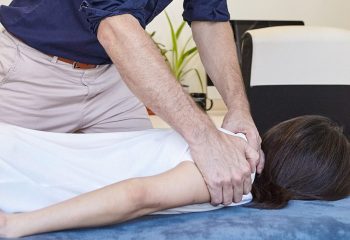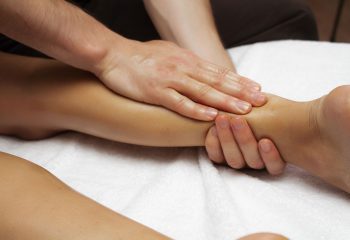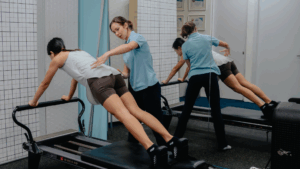If you’ve ever felt a sudden spinning sensation or unsteadiness, you may be experiencing vertigo. While the symptoms can be alarming, the good news is that vertigo is treatable—especially with the right care. At City Osteopathy & Physiotherapy, our specialised team of physiotherapists is here to help you understand and manage your condition, providing expert treatment for long-term relief.
What is vertigo?
Vertigo meaning
Vertigo is often described as a spinning or dizzy feeling, even when you’re standing still. This sensation can make it difficult to walk, balance, or carry out everyday activities. Vertigo is not a disease but a symptom of an underlying issue, most commonly related to problems in the inner ear or brain, also known as vestibular disorders. Learn more about the vestibular system here.
What is the difference: Vertigo vs dizziness?
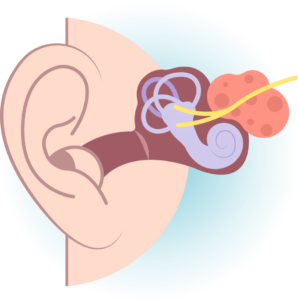 Many people use the terms vertigo and dizziness interchangeably, but they are actually distinct sensations.
Many people use the terms vertigo and dizziness interchangeably, but they are actually distinct sensations.
- Dizziness refers to a general feeling of lightheadedness, faintness, or unsteadiness. For example, you might feel dizzy after standing up too quickly or after spinning around. This sensation is more like feeling off-balance or as if you might faint. It’s often linked to issues like dehydration, low blood sugar, or anxiety.
- Vertigo, on the other hand, involves a false sense of movement or spinning. It feels as though either you or the environment around you is moving, even when everything is still. For instance, someone with vertigo might feel as though they are swaying or that the room is spinning, even when they are lying down. Vertigo is usually linked to inner ear problems, such as benign paroxysmal positional vertigo (BPPV), where small particles in the ear disrupt balance.
Understanding the difference is important for getting the right treatment. If you’re unsure which sensation you’re experiencing, a consultation with a healthcare professional can help determine the cause.
What are vertigo symptoms?
The symptoms of vertigo can vary in intensity and duration depending on the underlying cause, but common symptoms include sensations of spinning, imbalance, nausea, ringing in the ears, and sweating.
A sensation of spinning or tilting

Balance problems
Vertigo can significantly affect your balance, making it hard to stand or walk without feeling wobbly or unsteady. You may feel as though you’re about to fall over, especially if you try to move quickly or change direction. Some people experience a constant feeling of being off-balance, which can increase the risk of falls, especially in older adults.
Nausea or vomiting
 The spinning sensation caused by vertigo can also trigger nausea, similar to motion sickness. In more severe cases, this nausea can lead to vomiting. For instance, you might feel queasy after a short spell of vertigo, and in prolonged episodes, the nausea can intensify to the point of vomiting, especially if the spinning sensation persists for a long time.
The spinning sensation caused by vertigo can also trigger nausea, similar to motion sickness. In more severe cases, this nausea can lead to vomiting. For instance, you might feel queasy after a short spell of vertigo, and in prolonged episodes, the nausea can intensify to the point of vomiting, especially if the spinning sensation persists for a long time.
Ringing in the ears (Tinnitus)
Many people with vertigo, especially those with conditions like Meniere’s disease, experience tinnitus, a ringing or buzzing sound in one or both ears. This ringing can accompany vertigo attacks and may also be linked to hearing loss or a feeling of fullness in the ear. This symptom can make it harder to concentrate and can exacerbate feelings of disorientation.
Sweating
Vertigo can trigger the body’s stress response, leading to excessive sweating, even in cool environments. This is often a reaction to the disorientation and nausea caused by the spinning sensation. For example, during a vertigo episode, you may suddenly break into a cold sweat, feel clammy, and experience a rapid heartbeat as your body reacts to the overwhelming feeling of imbalance.
What are some vertigo causes?
Vertigo can be caused by various factors, including:
- Benign paroxysmal positional vertigo (BPPV): A common cause due to tiny calcium particles in the inner ear.
- Inner ear infections like labyrinthitis.
- Meniere’s disease: A disorder of the inner ear.
- Head or neck injuries.
How long does vertigo last?
The duration of vertigo episodes can differ. Some people experience brief, sudden spells that last only a few seconds or minutes, while others may endure vertigo symptoms for hours or even days. The underlying cause, such as benign paroxysmal positional vertigo (BPPV) or Meniere’s disease, often dictates how long vertigo lasts.
If your vertigo lasts longer than a few hours or recurs frequently, it’s important to see a healthcare professional, such as a vertigo specialist or vestibular physiotherapist. Early assessment and treatment can help identify the root cause and provide relief from symptoms, preventing further complications.
How to stop vertigo?
While vertigo can be unsettling, there are ways to manage it:
- Medications can alleviate symptoms but aren’t always a long-term solution.
- Physiotherapy, particularly vestibular therapy, is highly effective at addressing the root cause.
Getting vertigo treatment in Singapore – Types of treatment
Vertigo treatment varies depending on its underlying cause, and while there are several approaches, not all are equally effective for every individual. Common treatments include medication, lifestyle adjustments, and specialised physiotherapy.
At City Osteopathy & Physiotherapy, we believe that while medication may offer temporary relief, it only addresses the symptoms. Vertigo medications can reduce dizziness or nausea but don’t prevent future episodes.
In contrast, vestibular physiotherapy targets the root cause, providing long-term relief through tailored exercises and manual techniques. Our specialists use advanced methods to restore balance and help prevent vertigo from recurring.
Vertigo Medicine
Medications are commonly prescribed to help manage the symptoms of vertigo, particularly in acute cases where dizziness, nausea, or vomiting is severe. These medications include anti-nausea drugs like meclizine (Antivert), dimenhydrinate (Dramamine), or promethazine (Phenergan). While they provide quick symptom relief, they do not address the root cause of vertigo, such as issues within the inner ear or vestibular system. Therefore, while medication can be helpful for short-term relief, it’s not a long-term solution for most people suffering from recurring vertigo.
Pros of Vertigo Medication
- Provides quick relief from symptoms: Medications like meclizine or promethazine can reduce nausea and dizziness within a short period, making them useful in managing sudden or severe episodes of vertigo.
- Useful in acute cases: If you experience an intense bout of vertigo that leaves you unable to function, medications can offer immediate relief and help you get back on your feet.
Cons of Vertigo Medication
- Doesn’t resolve the underlying issue: While medications can relieve symptoms, they do not treat the root cause of vertigo, which could be an inner ear disorder, vestibular dysfunction, or another medical condition. Without addressing the cause, the symptoms are likely to return.
- Side effects such as drowsiness: Many vertigo medications, especially anti-nausea drugs, come with side effects like drowsiness, dry mouth, and blurred vision, which can impact daily activities. For instance, medications like meclizine can cause fatigue, limiting your ability to drive or concentrate.
In many cases, medication is only a temporary solution. For those seeking long-term relief, vestibular physiotherapy offers a more effective way to address the root causes of vertigo and prevent future episodes.
Physio treatment for vertigo
 Vestibular physiotherapy is one of the most effective ways to treat vertigo. At City Osteopathy & Physiotherapy, our vestibular disorder physiotherapists work to retrain your balance system and reduce vertigo symptoms.
Vestibular physiotherapy is one of the most effective ways to treat vertigo. At City Osteopathy & Physiotherapy, our vestibular disorder physiotherapists work to retrain your balance system and reduce vertigo symptoms.
What happens during vertigo therapy?
Your physiotherapist will begin by assessing your symptoms and identifying the underlying cause. Treatment may involve specific head and body movements, exercises to improve balance, and techniques to stabilise your vision. Learn more about our various treatment methods for vestibular disorders here.
Finding a vertigo treatment specialist in Singapore
Seeking a vestibular disorder physiotherapist can be life-changing if you suffer from vertigo. At City Osteopathy & Physiotherapy, our experts specialise in diagnosing and treating vertigo, helping you find long-lasting relief.
Our vestibular specialists employ advanced techniques designed to improve your balance and address the root causes of your vertigo. Through a comprehensive assessment, our specialists identify the specific factors contributing to your symptoms, whether they are related to inner ear issues, vestibular dysfunction, or other underlying conditions.
Personalised treatment plans
Once we understand your unique situation, we create a personalised treatment plan tailored to your needs. This may include a combination of vestibular rehabilitation exercises, which are specifically designed to enhance your balance and coordination. These exercises help retrain your brain to process balance information more effectively, ultimately reducing the intensity and frequency of your vertigo episodes.
Manual therapy techniques
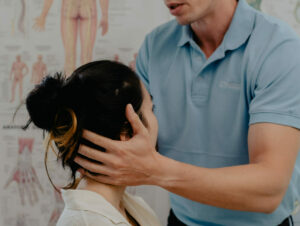 In addition to exercises, our specialists may employ manual therapy techniques to alleviate any musculoskeletal restrictions that may be contributing to your symptoms. This hands-on approach helps restore normal movement patterns, improving your overall physical function and comfort.
In addition to exercises, our specialists may employ manual therapy techniques to alleviate any musculoskeletal restrictions that may be contributing to your symptoms. This hands-on approach helps restore normal movement patterns, improving your overall physical function and comfort.
Education and self-management
We also emphasise the importance of education in managing vertigo. Our specialists provide you with the knowledge and tools necessary to understand your condition better and recognise potential triggers. This education empowers you to take proactive steps in your daily life, which can significantly reduce the likelihood of future episodes.
Ongoing support
At City Osteopathy & Physiotherapy, we believe in offering ongoing support throughout your treatment journey. Our vestibular specialists will monitor your progress, adjust your treatment plan as needed, and provide guidance to ensure you are equipped to manage your vertigo effectively. With our holistic and evidence-based approach, we aim to not only relieve your current symptoms but also promote long-term wellness and stability.
Is there vertigo treatment at home?
While physiotherapy is recommended for comprehensive treatment, there are some exercises and lifestyle modifications you can try at home to help alleviate symptoms of vertigo. It’s important to consult with a specialist before starting any new exercise program to ensure it is safe and appropriate for your specific condition.
What Are vertigo exercises to alleviate symptoms?
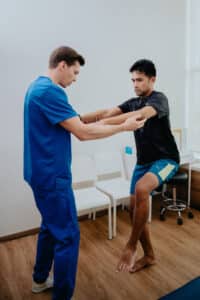
1. Brandt-Daroff exercise for vertigo
This exercise is particularly effective for those experiencing Benign Paroxysmal Positional Vertigo (BPPV). It involves a series of movements that can help retrain the brain’s response to balance signals. To perform this exercise:
- Sit on the edge of your bed.
- Lie down on one side with your head turned 45 degrees towards the ground.
- Hold this position for about 30 seconds or until symptoms subside.
- Return to the sitting position and wait for a minute.
- Repeat on the other side.This exercise can be done several times a day as directed by your healthcare provider.
2. Epley maneuver for vertigo
This is another effective exercise for BPPV that can help reposition the crystals in your inner ear. While it’s best to learn this from a specialist, it can be practiced at home once you understand the proper technique. The maneuver involves a series of specific head and body positions designed to relieve vertigo.
3. Gaze stabilisation exercises for vertigo
These exercises help improve your ability to focus on objects while your head is in motion. A common method is to hold a target, like a letter or a small object, at eye level and move your head side to side or up and down while keeping your eyes fixed on the target.
4. Balance exercises for vertigo
Practicing standing on one leg or walking heel-to-toe can enhance your balance over time. You can also try tai chi, which focuses on slow, controlled movements that promote stability and coordination.
Lifestyle modifications for vertigo
In addition to specific exercises, certain lifestyle modifications can help manage vertigo symptoms effectively:
- Stay hydrated: Dehydration can exacerbate dizziness and balance issues, so ensure you drink enough fluids throughout the day.
- Avoid sudden movements: Quick changes in position can trigger vertigo. When standing up, for instance, do so slowly to allow your body to adjust.
- Limit caffeine and alcohol: Both substances can affect your balance and hydration levels, potentially worsening vertigo symptoms. Reducing or eliminating them from your diet may help.
- Manage stress: High stress and anxiety can trigger or exacerbate vertigo. Techniques such as deep breathing, meditation, or yoga can promote relaxation and help manage symptoms.
- Use assistive devices: If you experience severe symptoms, consider using a cane or walker for added stability when moving around.
Always consult with a healthcare professional before implementing any of these exercises or lifestyle changes to ensure they are suitable for your specific situation.
Take the first step towards effective care and recovery from vertigo
If you’re experiencing any symptoms of vertigo, we invite you to explore the wealth of free resources available online, like this article, to better understand your condition. At City Osteopathy & Physiotherapy, our commitment is to provide you with the best possible care. While these resources can be helpful, we highly recommend visiting one of our 6 clinics for a comprehensive consultation and check-up. Our skilled vestibular physiotherapists are dedicated to delivering effective, personalised treatment to help you regain your balance and overall well-being.
Start your recovery journey with us—book your consultation today for expert and compassionate care.
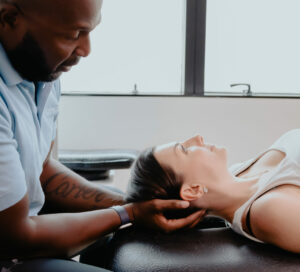
FAQ about vertigo
Is vertigo dangerous?
While vertigo itself is not considered a dangerous condition, it can significantly increase the risk of falls and accidents due to impaired balance and spatial awareness. Individuals experiencing vertigo may feel unsteady, dizzy, or unable to coordinate their movements, making everyday activities like walking or driving potentially hazardous. Moreover, untreated vertigo can lead to complications such as injuries from falls or chronic instability.
Therefore, seeking appropriate treatment is essential to manage symptoms effectively and prevent complications. A thorough evaluation by a healthcare professional can help identify the underlying cause of vertigo and establish a suitable treatment plan to minimise risks.
Can I experience vertigo after eating?
Yes, vertigo can occasionally be triggered by certain foods, particularly in individuals with conditions like Meniere’s disease or vestibular migraines. Foods high in salt can lead to fluid retention in the inner ear, potentially worsening symptoms. Additionally, some people may find that specific food triggers—such as aged cheeses, chocolate, or alcohol—can provoke vertigo episodes.
If you notice a correlation between your eating habits and the onset of vertigo, it’s advisable to keep a food diary to identify potential triggers and discuss these findings with a healthcare professional for personalised dietary advice.
Can indigestion cause vertigo?
While there is no direct link between indigestion and vertigo, some individuals may experience vertigo symptoms related to anxiety or stress associated with digestive issues. For instance, the discomfort of indigestion can lead to feelings of unease or panic, which may trigger dizziness or lightheadedness in some people. Moreover, gastrointestinal problems can occasionally affect the inner ear’s function, potentially contributing to balance issues.
If you experience vertigo along with digestive symptoms, it’s important to consult a healthcare provider to explore potential underlying causes and receive appropriate treatment.
What is the recommended diet for vertigo patients?
For individuals suffering from vertigo, particularly those with Meniere’s disease, a diet low in sodium, caffeine, and alcohol may help alleviate symptoms. High sodium intake can lead to fluid retention, which can exacerbate pressure in the inner ear and worsen vertigo episodes. Reducing caffeine and alcohol consumption can also be beneficial, as both substances may affect hydration levels and inner ear function.
Incorporating a balanced diet rich in fresh fruits, vegetables, whole grains, and lean proteins can promote overall health and well-being. It’s essential to work with a healthcare professional or a nutritionist to create a personalised dietary plan that addresses individual needs and triggers.


